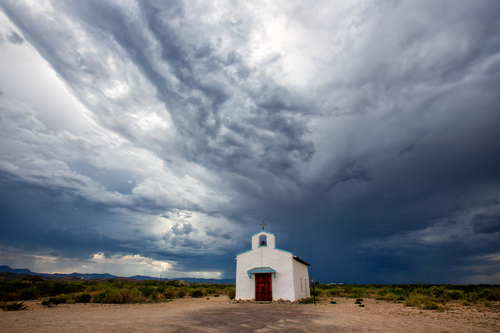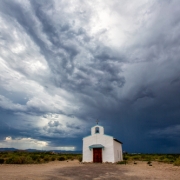The Perfect Church
/1 Comment/in Weekly Devotional/by David GuzikSo continuing daily with one accord in the temple, and breaking bread from house to house, they ate their food with gladness and simplicity of heart, praising God and having favor with all the people. And the Lord added to the church daily those who were being saved. (Acts 2:46-47)
In these two last verses from Acts 2, we see the health and vitality of the early church. We never want to over-romanticize those first Christians, but there was something undeniably special about what is described in Acts 2.

– It was a unified church, continuing daily with one accord.
– It was a learning, connected church, meeting daily…in the temple.
– It was a Jesus-honoring church, breaking bread – they remembered the death of Jesus on the cross together.
– It was a church connected to home life, meeting from house to house.
– It was a church that joyfully ate together, as they ate their food with gladness.
– It was a church that didn’t take itself too seriously, living with simplicity of heart.
– It was a worshipping church, praising God.
– It was a winsome and magnetic church, having favor with all the people.
– It was a God-blessed and growing church, as the Lord added to the church daily.
– It was a church full of God’s salvation, growing in those who were being saved.
It wasn’t a perfect church. Soon enough we will see problems arise in the Book of Acts. However, it was something special – something every Christian today reads about and longs to experience, even if just for a period.
If you have had a wonderful church experience like this, then praise God for it. It isn’t always this good, but there are seasons of remarkable advance and vitality among God’s people.
Is there something we can do to make it happen? Times of such wonderful life and progress are the work of God’s hand and are ordered by His wisdom. They aren’t manufactured by our hard work and clever techniques.
However, if we long for such times, there are two definite areas to address. The first is prayer. If such times come from heaven, then we ask heaven to send true revival, and ask God to begin with us. The second is simply, to the best of our ability as God helps us, to do the things of Acts 2:42-45:
And they continued steadfastly in the apostles’ doctrine and fellowship, in the breaking of bread, and in prayers. Then fear came upon every soul, and many wonders and signs were done through the apostles. Now all who believed were together, and had all things in common, and sold their possessions and goods, and divided them among all, as anyone had need.
It was these trusting, faithful, energetic disciples that saw the wonderful life of Acts 2:46-47.
2 Timothy 4:2 says we should do God’s work “in season and out of season.” We will be faithful no matter what, but there’s no doubt: in season feels better. May God bring our churches into Acts 2:46-47 seasons!
Gemeinschaft, kein Kommunismus
/0 Comments/in Wöchentliche Andacht/by David GuzikAlle Gläubigen waren aber beisammen und hatten alle Dinge gemeinsam; sie verkauften die Güter und Besitztümer und verteilten sie unter alle, je nachdem einer bedürftig war. (Apostelgeschichte 2,44-45)
Es gab etwas Besonderes an der frühen Gemeinde. Sie war natürlich nicht perfekt, doch es gab in ihr ein geistliches Leben, einen Mut und einen echten Sinn für Gemeinschaft und ist damit bis heute ein machtvolles Beispiel für alle Gläubigen.
Diese zwei Verse sind eine schöne Beschreibung davon. Wir lesen alle Gläubigen waren beisammen. Unter den Gläubigen gab es eine beeindruckenden Einheit und Gemeinschaft. In Apostelgeschichte 2,41 steht, dass von den Juden, die sich zum Pfingstfest versammelt hatten, sich 3000 Menschen nach der Predigt des Paulus bekehrten. Viele der 3000 neuen Gläubigen waren von weit her nach Jerusalem gekommen.

Diese Besucher taten Buße, glaubten und wurden getauft. Danach gingen sie nicht weiter ihrer Wege – sie wollten im Glauben und in der Nachfolge Jesu wachsen, also waren alle Gläubigen beisammen. Das jüdische Volk war damals unglaublich gastfreundlich während jedem großen Fest wie Pfingsten. Sie luden Besucher zu sich nach Hause ein und nahmen für die Übernachtungsmöglichkeit oder für Essen kein Geld. Die ersten Christen machten aus dieser Festtags-Gastfreundschaft eine Jederzeit-Gastfreundschaft.
Sie verbrachten nicht nur ihre Zeit zusammen, sie teilten auch ihren Besitz. Wir lesen, sie verteilten sie unter alle. Von den vielen Besuchern unter den 3000 Gläubigen hatte nicht jeder einer Job. Doch die Christen teilten und sorgten füreinander. Die frühe Familie der Christen musste teilen, um zu überleben.
Es gibt viele Leute, die behaupten, das sei eine frühe Form des Kommunismus oder ein „christlicher Kommunismus“ gewesen. Ich glaube, das ist eine irreführende und gefährliche Behauptung. Es gibt mindestens zwei wichtige Unterschiede. Erstens, es war freiwillig. Niemand hat die Gläubigen dazu gezwungen, ihren Besitz zu teilen. Niemand zwang sie dazu, die Güter und Besitztümer zu verkaufen und sie unter allen zu verteilen. Es war eine freiwillige Sache und vom Heiligen Geist geführt.
Erzwungender Kollektivismus – in der Form des Kommunismus oder vielen anderen Formen des Sozialismus – war schon immer ein großes Übel in der Welt. Das Ziel einer besseren Welt durch erzwungenen Kollektivismus war die Rechtfertigung für den Mord an bis zu 100 Millionen Menschen im 20. Jahrhundert.
Der andere Unterschied ist, dass es zeitlich begrenzt war. Wir haben keinen Hinweis darauf, dass dies über lange Zeit andauerte. Es war eine spontane Reaktion auf eine augenblickliche Not.
Doch es ist etwas Schönes daran, dass sie die Güter und Besitztümer verkauften und verteilten unter alle, je nachdem einer bedürftig waren.
Die Macht Gottes war unter ihnen sichtbar, denn Jesus war für sie wichtiger als ihr Besitz. Das war echte Gemeinschaft.
Wir alle wünschen uns diese Art von Gemeinschaft – das klingt wundervoll! Bete also heute dafür, dass Gott mit dir beginnt und dir ein Herz schenkt, das gerne teilt.
Hier klicken um im Rahmen unser Jahres Abschluss Kampagne zu spenden.
Comunidad, no comunismo
/0 Comments/in Devocional Semanal/by David GuzikTodos los que habían creído estaban juntos y tenían en común todas las cosas: vendían sus propiedades y sus bienes y lo repartían a todos según la necesidad de cada uno. (Hechos 2:44-45)
Había algo especial acerca de la iglesia primitiva. No eran perfectos, pero existía una vida espiritual, valor y un verdadero sentido de comunidad entre ellos que sirve como un ejemplo para los creyentes desde su tiempo.
Estos dos versículos describen muy bien este punto. Leemos que todos los que habían creído estaban juntos. Había una comunidad y unidad impresionantes entre los creyentes. Leemos en Hechos 2:41 que entre el pueblo judío reunido en ese día de Pentecostés, unos 3,000 respondieron a la predicación de Pedro. Muchos de esos 3,000 creyentes habían viajado desde muy lejos para llegar a Jerusalén para el día de Pentecostés como peregrinos.

Estos visitantes se arrepintieron, creyeron y fueron bautizados. Luego, no siguieron sus propios caminos, sino que querían crecer en su fe y seguir a Jesús, así que todos los que habían creído estaban juntos.
Los judíos de ese día tenían una gran costumbre de hospitalidad durante cualquier fiesta importante como la de Pentecostés. Los visitantes eran recibidos en casas particulares y nadie podía cobrar por alojar a un visitante, o por suplir sus necesidades básicas. Los primeros cristianos tomaron esta costumbre de hospitalidad durante las fiestas y la convirtieron en costumbre de todos los días.
No solo compartieron sus vidas; también compartieron sus posesiones materiales. Leemos que tenían en común todas las cosas. Muchos de los 3,000 eran visitantes que no tenían trabajo. Pero los cristianos compartieron y se ayudaron unos a otros. La primera familia de cristianos tuvo que compartir si querían sobrevivir.
Ha habido más de unas pocas personas que afirman que esta fue una expresión temprana del comunismo o “comunismo cristiano”. Yo creo que esta declaración es peligrosa y engañosa. Esta situación era diferente del comunismo en al menos dos formas importantes. Primero, fue voluntario. Nadie forzó a los creyentes a vender sus propiedades y sus bienes y repartirlo a todos. Esto fue voluntario y dirigido por el Espíritu Santo.
El colectivismo forzado, en forma de comunismo o muchas formas de socialismo, ha sido un gran mal en el mundo. El objetivo de un mundo mejor a través del colectivismo forzado fue la pretendida justificación del asesinato de hasta 100 millones de personas en el siglo XX.
La otra diferencia es que esto fue temporal. No tenemos ninguna evidencia que esto haya continuado por mucho tiempo. En cambio, fue la respuesta espontánea a una necesidad inmediata.
Sin embargo, hay algo maravilloso que vendían sus propiedades y sus bienes y lo repartían a todos según la necesidad de cada uno.
El poder de Dios fue evidente entre ellos porque Jesús se volvió mucho más importante para ellos que sus posesiones. Fue una verdadera comunidad.
Todos queremos este tipo de comunidad, ¡suena maravilloso! Hoy, pídele a Dios que comience contigo y te dé un corazón que comparte.
Haz clic aquí para hacer una donación de fin de año para Enduring Word




